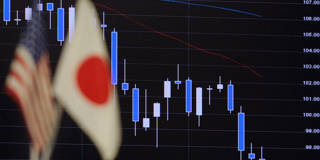By creating a moderately inflationary environment, also called a “high-pressure economy,” a weak yen was an important catalyst for Japan’s post-World War II economic miracle. Now, as the currency continues to depreciate against the dollar, it is worth considering whether something similar will happen.
NEW HAVEN – Currency fluctuations affect different populations in different ways. Consider the recent decline of the yen, which slid from around ¥103 against the dollar at the end of 2020 to a multi-decade low of around ¥151 in late 2023. The weak yen has forced some of my economist friends in Japan to cancel their research trips to the United States because their grants now fall far short of travel expenses. On the other hand, Japan’s tourism sector is booming, as a trip to Tokyo has become a bargain.
This raises the question of whether a local currency’s appreciation or depreciation is more desirable for boosting macroeconomic performance. In the case of Japan, an archipelago that is heavily dependent on trade, a stronger yen could be beneficial, because the terms of trade usually improve as the currency’s value rises. The same volume of exports would translate into more imports.
But when a country earns substantial revenues from overseas investment, a weaker local currency increases consumption opportunities. For example, the Government Office of Japan estimates that the country’s gross national income (GNI) was 6% higher than its GDP in July 2023, largely owing to a cheap yen. This indicates that Japanese who receive more income from foreign investment now enjoy greater purchasing power.

NEW HAVEN – Currency fluctuations affect different populations in different ways. Consider the recent decline of the yen, which slid from around ¥103 against the dollar at the end of 2020 to a multi-decade low of around ¥151 in late 2023. The weak yen has forced some of my economist friends in Japan to cancel their research trips to the United States because their grants now fall far short of travel expenses. On the other hand, Japan’s tourism sector is booming, as a trip to Tokyo has become a bargain.
This raises the question of whether a local currency’s appreciation or depreciation is more desirable for boosting macroeconomic performance. In the case of Japan, an archipelago that is heavily dependent on trade, a stronger yen could be beneficial, because the terms of trade usually improve as the currency’s value rises. The same volume of exports would translate into more imports.
But when a country earns substantial revenues from overseas investment, a weaker local currency increases consumption opportunities. For example, the Government Office of Japan estimates that the country’s gross national income (GNI) was 6% higher than its GDP in July 2023, largely owing to a cheap yen. This indicates that Japanese who receive more income from foreign investment now enjoy greater purchasing power.